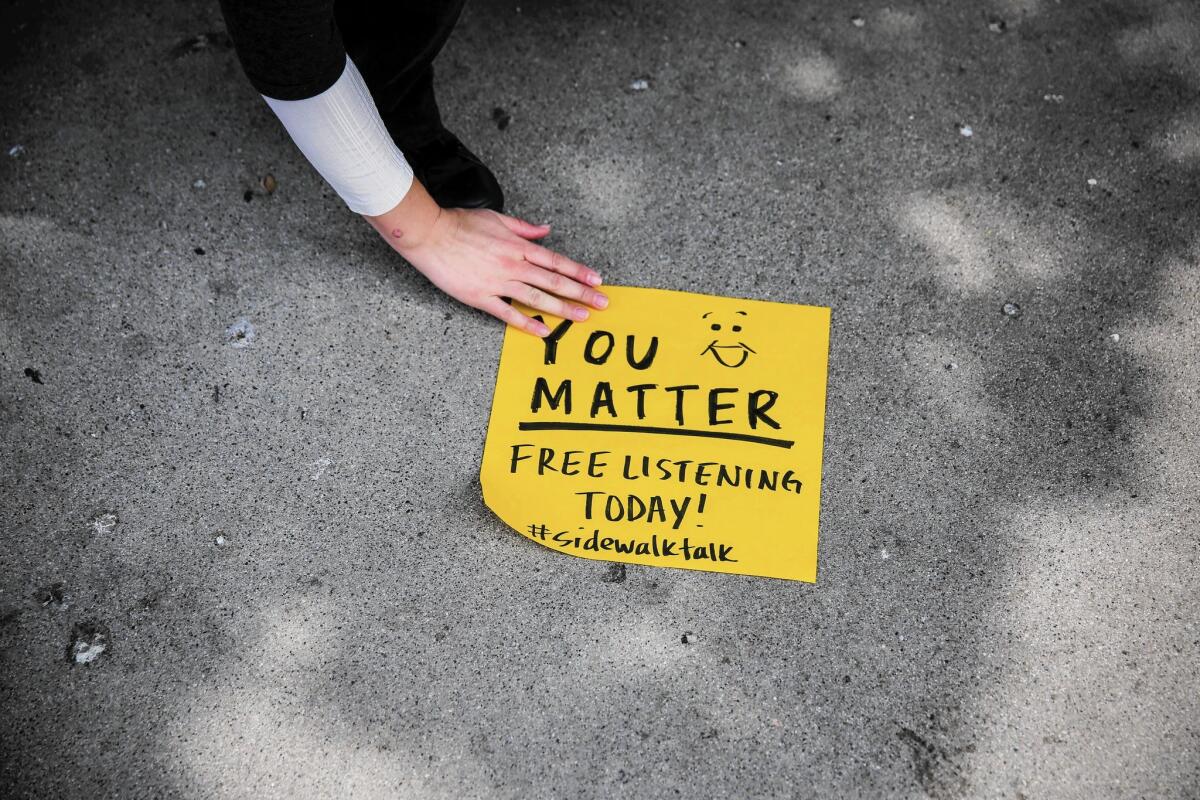L.A.’s Sidewalk Talk: really listening to words on the street

- Share via
Brooke Dooley looked around, not quite sure how to proceed.
She and a small group of volunteers had just arrived at the North Hollywood Metro Station to participate in an event called Sidewalk Talk — ready to listen to any passersby who wanted to chat, offering Angelenos the simple gift of being heard.
The task seemed easy enough, but logistics were getting in the way. The wind picked up, making it hard for Dooley to hang up her “Free Listening” signs. Security guards at the station had strong opinions about where the group could and could not stand.
Eventually she was able to set up two plastic chairs on a stretch of heavily trafficked sidewalk along Lankershim Boulevard, wedged between a bus stop and a coin-operated public restroom. A man on a bicycle pedaled by, back and forth, hawking pepper spray for $5.
“We’ll see how it goes,” Dooley said. “This is an experiment.”
Sidewalk Talk, the brainchild of Bay Area therapists Traci Ruble and Lily Sloane, organizes groups of volunteer “listeners,” training them and sending them into the streets. The first event took place May 7 in San Francisco, where about 30 listeners chatted up strangers in 12 locations.
The Los Angeles Sidewalk Talk, organized by Dooley with Ruble’s and Sloane’s support, sent a somewhat smaller collection of listeners — mainly therapists and actors — to eight spots around the city last week: North Hollywood, Universal City, Echo Park, Hollywood, Beverly Hills, Santa Monica and two locations downtown.
The idea was to get people talking and see what happened.
“This is not therapy,” Dooley stressed. “It’s simply listening.”
For Ruble and Sloane, a primary focus of Sidewalk Talk is destigmatizing therapy — helping people who might feel strange about unburdening themselves to open up.
Dooley brings an additional motive: She’s producing a film that deals with kids’ mental health, “seeking to spark self-refection among youth, adults, educators and parents,” Dooley said.
Sidewalk Talk fit in nicely with that effort. But the movie didn’t really come up that afternoon. Dooley was in the moment.
It took a while for people to warm to her pitch. Many thought there must be a catch — that the listeners were selling something or proselytizing. In time, people started asking what the group was up to and conversations got going.
Dooley talked for 20 minutes or so with a woman named Teri, who lives on the streets and preaches. She wouldn’t share her last name or where she slept at night, but Teri told Dooley how grateful she was for the attention.
Afterward, she said she felt their encounter was meant to be.
“For her to come out here and take her time to talk to a total stranger is really, really touching,” Teri said. “We live in a place where everyone is distracted — the busier you are, the more relevant you are. Instead of going out there to do, do, do, this is slowing down and showing you care.
“Whether it will fix my problem or not...” She shrugged, her voice trailing off.
A few feet away, 18-year-old Arrieiana Cowan talked cheerfully with Ben Mathes, an actor, producer and founder of Urban Confessional, an L.A.-based group whose members engage in a similar sort of public listening every week, in part to hone their theatrical craft.
Cowan, like Teri, spoke of God. Many who stop for free listening do, Mathes said.
Friends Kay Hampton and Chanice Edwards, college students who had grown up together in Ohio, talked to Dooley about dance, family, “life turning points” and their special bond.
“You never think about how far you’ve come until you talk about where you’ve been,” said Edwards, 21.
Dooley loved their youth, and their enthusiasm about being heard. She decided meeting them was the perfect way to end the day.
In all, Dooley’s crew interacted with a dozen or so talkers. At the other posts around town that day, results were mixed.
Some volunteers had stayed busy chatting, while others couldn’t persuade anyone to stop. But according to Dooley, all said the exercise made them feel connected to the city. A few asked to listen again.
She considered the day a success.
“That was wonderful, the whole thing,” Dooley said as she packed up her chairs and signs.
Twitter: @LATerynbrown
More to Read
Sign up for Essential California
The most important California stories and recommendations in your inbox every morning.
You may occasionally receive promotional content from the Los Angeles Times.











